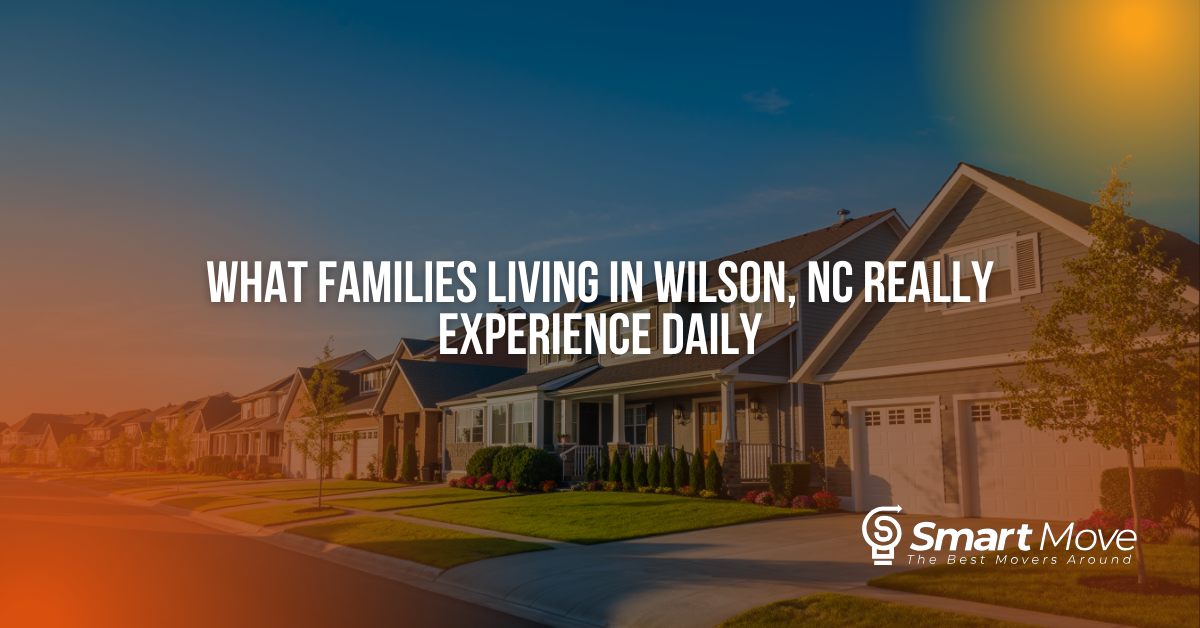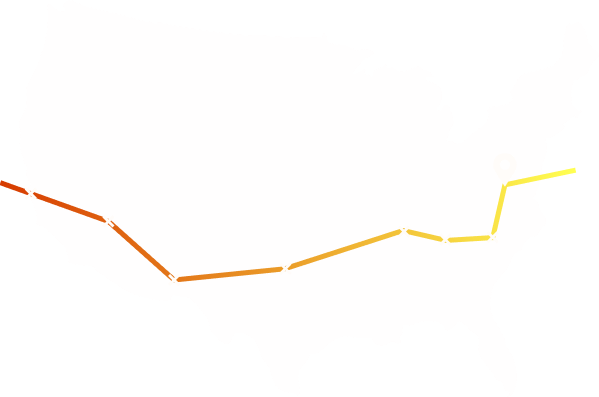Wilson Cost of Living: Complete Budget Guide 2025
Wilson, North Carolina, is a growing city known for its friendly neighborhoods, convenient location near major highways, and a balanced mix of urban and suburban living. Whether you’re moving for work, planning to retire, or simply exploring affordable cities in North Carolina, understanding the Wilson cost of living is essential for planning your budget.
In this comprehensive Wilson budget guide, we break down every major expense you’ll encounter, from housing and utilities to groceries, transportation, healthcare, and entertainment. With insights drawn from local sources, government data, and real-world pricing, this guide ensures you’re prepared to make informed decisions about living in Wilson.
Overview of Wilson, NC
Wilson, NC, is a charming city with a population of around 50,000 residents, offering a mix of small-town comfort and modern conveniences. Known for its welcoming neighborhoods and rich history, Wilson is conveniently located near Raleigh, Durham, and Fayetteville, making it ideal for commuters or those looking to explore the Research Triangle region.
- Local Economy: Wilson’s economy is supported by healthcare, manufacturing, education, and retail sectors, providing diverse job opportunities.
- Neighborhoods: Popular areas include West Wilson, known for historic homes and tree-lined streets; Five Points, offering trendy shops and eateries; and East Wilson, which provides affordable housing options.
- Transportation: The city is well-connected via I-95, US 301, and several bike-friendly streets, making commuting and local travel easy.
- Local Services: Residents enjoy access to grocery stores like Harris Teeter and Food Lion, fitness centers such as Anytime Fitness, and community spaces including Wilson City Parks.
- Lifestyle Perks: From cultural events at the Wilson Arts Center to family-friendly attractions like the Children’s Museum of Wilson, the city offers activities for all ages.
Housing Costs in Wilson, NC
Wilson housing is typically the largest expense for residents, and Wilson offers a variety of options ranging from apartments to single-family homes. Prices remain affordable compared to larger cities in North Carolina, making it an attractive choice for newcomers.
Average Rent by Neighborhood
- West Wilson: Known for its historic homes along Nash Street and Vance Street, rent for a
one-bedroom apartment averages $1,225 per month, while
two-bedroom units range $1,308. This area is close to the Wilson County Public Library and the Wilson Arts Center.
- Five Points: A vibrant neighborhood featuring boutique shops on Goldsboro Street and dining at spots like Bourbon Street Grille,
one-bedroom apartments average $950–$1,200, and two-bedroom units are around $1,200–$1,500.
- East Wilson: More affordable options can be found along Herring Avenue and Lee Street, with
one-bedroom apartments renting for $750–$950 and two-bedrooms for $950–$1,200. Residents are close to Wilson Community College and local parks.
Buying a Home in Wilson
- Average Home Prices:
Single-family homes in Wilson generally range $217,000, depending on neighborhood and property size. Homes in West Wilson tend to be more historic and higher-priced, while East Wilson offers newer or more affordable homes.
- Popular Streets & Areas: Homes along Nash Street, Goldsboro Street, and Westwood Avenue are highly sought after. The Wilson Country Club area offers upscale homes and proximity to recreational amenities.
- Property Taxes: Wilson’s property tax rate is around 0.74%, slightly below the state average, making homeownership more budget-friendly.
Check local listings on Zillow and Wilson Housing Authority websites to explore smaller local real estate properties. Also, you can check out BestPlaces.net to give you a complete list of the Wilson cost of living.
Utilities and Internet Costs in Wilson, NC
In addition to housing, utilities are an important part of your monthly budget in Wilson. While costs are generally lower than in larger cities, it’s helpful to know what to expect.
- Electricity: Average monthly bills range from $120–$160 for a standard 1,500 sq. ft. home. Wilson Energy is the main provider, offering energy-saving programs for residents.
- Water and Sewer: Combined water and sewer costs typically run $50–$80 per month, depending on household size. Services are managed by City of Wilson Public Utilities.
- Gas: For homes with natural gas heating or cooking, expect bills around $40–$70 per month.
- Trash and Recycling: Waste services are generally $20–$35 per month through city collection programs.
- Internet and Cable: High-speed internet is available from providers like Spectrum and AT&T Fiber. Average internet cost ranges $50–$80 per month for speeds suitable for streaming and remote work. Cable packages start at $70–$100 per month.
- Mobile Plans: Major carriers, including Verizon, AT&T, and T-Mobile, operate in Wilson, with average monthly costs of $40–$70 per line for standard plans.
Transportation Costs in Wilson, NC
Getting around Wilson is relatively convenient, whether you drive, bike, or use public transportation. While many residents rely on personal vehicles, the city also offers public transit options and bike-friendly areas for short trips. Understanding transportation costs can help you budget effectively for daily commuting and travel.
Gas, Car Insurance, and Maintenance
Owning a car is the most common way to get around Wilson, and these costs make up a significant portion of your monthly budget. From fuel to routine maintenance, knowing what to expect can prevent surprises.
- Gas Prices: The average cost of regular gas in Wilson is around $3.40–$3.70 per gallon. Major stations include Shell on Nash Street and Exxon on Goldsboro Street.
- Car Insurance: Monthly premiums vary depending on coverage and driving history, averaging $120–$180 per month for standard policies. Providers include State Farm, Geico, and Allstate.
- Maintenance: Routine maintenance (oil changes, tire rotation, and minor repairs) averages $50–$100 per month when budgeted annually. Local service shops include Wilson Auto Repair and Carolina Tire & Auto.
Public Transportation
Although most residents rely on cars, Wilson provides public transportation for convenient local travel. This is a cost-effective option for students, retirees, and those without personal vehicles.
- Wilson offers a small bus system managed by Wilson Transit, with fares around $1–$2 per ride.
- Ride-sharing options like Uber and Lyft are also available throughout the city, especially near downtown and Five Points.
Commuting and Roads
Wilson’s central location and well-maintained roads make commuting to nearby cities straightforward. Residents benefit from accessible highways and main streets that connect neighborhoods to key destinations.
- Highways: I-95 runs just west of Wilson, providing easy access to Raleigh, Fayetteville, and other cities. US 301 cuts through the city center, connecting residents to local businesses and schools.
- Major Streets: Nash Street, Goldsboro Street, Herring Avenue, and Vance Street are key arteries for daily commuting.
- Bike-Friendly Areas: Neighborhoods like Five Points and parts of West Wilson offer bike lanes along Goldsboro Street and Green Street, making it easier for short commutes.
For more detailed insights on local neighborhoods, check out our Wilson Neighborhood: Complete Area Guide.
Grocery and Dining Costs in Wilson, NC
Wilson groceries can vary depending on lifestyle and family size, but Wilson offers a range of affordable options for both groceries and dining out. Food expenses are a crucial part of any budget, and Wilson offers a mix of affordable groceries and diverse dining options. Whether you prefer cooking at home or eating out, understanding local prices can help you plan your monthly spending. From supermarkets to local restaurants, there are options to fit every budget and lifestyle.
Groceries
- Average Monthly Grocery Bill: Singles can expect to spend around $250–$350, while a family of four may spend $600–$800 per month.
- Popular Grocery Stores: Residents often shop at Harris Teeter, Food Lion, and Walmart Neighborhood Market for everyday staples.
- Local Farmers Markets: The Wilson Farmers Market on Nash Street provides fresh produce, baked goods, and local specialties, often at lower prices than chain stores.
- Typical Prices:
- Milk: $3.50/gallon
- Eggs: $2.50/dozen
- Bread: $2.50/loaf
- Fresh produce: $1–$3 per pound, depending on the item
Dining Out
- Casual Dining: Restaurants like Bourbon Street Grille, Mitch’s Taphouse, and Los Primos Mexican Restaurant offer affordable meals averaging $12–$20 per person.
- Mid-Range Options: For a family dinner or date night, places like Salem Street Cafe and Big Al’s Barbecue provide meals around $25–$40 per person.
- Coffee and Snacks: Local cafés such as Cuppa Coffee and Java Bean Café charge $3–$5 for specialty drinks, making it easy to budget for daily treats.
Tips for Saving:
- Shop at the Wilson Farmers Market for fresh and seasonal produce.
- Take advantage of weekly sales at major grocery stores.
- Look for lunch specials at local eateries like Mitch’s Taphouse to reduce dining expenses.
Healthcare and Insurance Costs in Wilson, NC
Access to quality healthcare is an important consideration when budgeting for life in Wilson. The city offers a mix of hospitals, clinics, and specialized care providers, ensuring residents can meet their medical needs without traveling far. Healthcare costs in Wilson are generally lower than in larger urban areas, making it more affordable for everyone.
Health Insurance
- Average Monthly Premiums: Health insurance costs vary based on coverage and age. Singles can expect to pay around $300–$450, while family plans may range from $900–$1,200 per month.
- Providers include Blue Cross Blue Shield, UnitedHealthcare, and Cigna, all offering plans suitable for Wilson residents.
Local Hospitals and Clinics
- Wilson Medical Center: The primary hospital serving Wilson and the surrounding areas, offering emergency care, surgical services, and specialty departments.
- WakeMed Wilson Healthplex: Provides outpatient services, imaging, and primary care.
- Local Clinics: Neighborhood clinics like Miller Street Family Practice and Carolina Health & Wellness provide routine checkups, vaccinations, and urgent care services.
Pharmacies
- Residents have convenient access to chain and local pharmacies including CVS, Walgreens, and Carter’s Pharmacy for prescription medications and over-the-counter needs.
Typical Costs
- Doctor’s Visit: $100–$150 without insurance
- Specialist Visit: $150–$250 without insurance
- Prescription Medications: Varies widely, but generics average $10–$30 per prescription
Education Costs in Wilson, NC
Education is an important factor for families moving to Wilson. The city offers a variety of public and private schools, as well as daycare centers and higher education institutions, all contributing to your household budget.
Public Schools
- Wilson is served by
Wilson County Schools, which includes highly-rated schools such as E. M. Yoder Elementary, G.W. Bulluck Middle School, and E. High School. Public education is free for residents, though some schools may request nominal fees for extracurricular activities.
Private Schools
- Families seeking private education can consider Saint Agnes Catholic School, Barton College Academy, and Wilson Christian Academy, where tuition ranges from $5,000–$12,000 per year, depending on grade level.
Daycare and Early Childhood Education
- Average daycare costs for infants and toddlers range from $700–$1,000 per month.
- Popular centers include Bright Beginnings Learning Center, Wilson Academy, and Kids Korner Daycare, providing structured early childhood programs.
Higher Education
- Wilson residents have access to nearby institutions such as Wilson Community College for associate degrees and vocational training, and Barton College in Wilson for four-year degrees.
- Tuition for in-state community college students averages $2,500 per year, while four-year private colleges range from $15,000–$25,000 annually.
Tips for Managing Education Costs:
- Explore scholarships and financial aid options for private schools and colleges.
- Consider public schools and community colleges for more affordable educational pathways.
Entertainment, Fitness, and Lifestyle in Wilson, NC
Wilson offers a variety of options for recreation, fitness, and cultural activities, making it easy for residents to maintain an active and enjoyable lifestyle. From parks and gyms to local events and entertainment venues, there’s something for everyone.
Fitness and Recreation
- Gyms and Fitness Centers: Popular choices include Anytime Fitness on Goldsboro Street, Planet Fitness on Nash Street, and Wilson Family YMCA for group classes and community programs. Monthly memberships range from $25–$60.
- Parks and Outdoor Spaces: Residents enjoy Clinton-MacKenzie Park, Green Street Park, and Wiggins Mill Reservoir for walking, biking, picnics, and outdoor sports. These parks provide free or low-cost recreational opportunities.
- Sports Leagues: Local leagues and community programs at Wilson Little League and Wilson Adult Soccer League encourage participation for all ages.
Entertainment and Cultural Activities
- Movie Theaters: Catch the latest films at Carolina Theater downtown or Cinemark Wilson Commons. Tickets average $10–$15.
- Arts and Culture: The Wilson Arts Center and Whirligig Park showcase local art, live performances, and cultural events.
- Dining and Nightlife: Neighborhoods like Five Points and downtown Wilson feature restaurants, breweries, and cafes, including Bourbon Street Grille and Mitch’s Taphouse, perfect for casual outings or evening entertainment.
Lifestyle Tips
- Take advantage of free or low-cost community events at Whirligig Park and local festivals.
- Combine gym memberships with outdoor park activities for cost-effective fitness.
- Explore local dining specials and happy hours to enjoy the food scene without overspending.

Budgeting Tips for Living in Wilson, NC
Managing your finances in Wilson doesn’t have to be complicated. By planning and taking advantage of local resources, you can live comfortably without overspending.
- Track Your Monthly Expenses: Keep a record of your Wilson housing, utilities, transportation, groceries, healthcare, and entertainment costs to identify areas for savings.
- Plan Your Housing Budget Wisely: Whether renting or buying, consider neighborhoods like West Wilson, Five Points, and East Wilson for options that fit your budget.
- Save on Utilities: Use energy-efficient appliances, monitor electricity usage, and explore bundled internet or cable plans to reduce monthly bills.
- Grocery and Dining Strategies: Shop at Harris Teeter, Food Lion, and Wilson Farmers Market, and take advantage of restaurant specials to keep food costs low.
- Transportation Savings: Carpool, use Wilson Transit for local travel, and maintain your vehicle regularly to avoid costly repairs.
- Healthcare Planning: Compare health insurance plans, utilize local clinics, and take advantage of wellness programs offered by Wilson Medical Center and other providers.
By following these practical budgeting tips, you can enjoy all that Wilson Utilities has to offer while keeping your expenses under control.
Frequently Asked Questions (FAQs)
1. What is the average cost of living in Wilson, NC?
The average cost of living in Wilson is generally lower than in larger cities in North Carolina. Housing, groceries, and utilities are especially affordable, making it a great option for families, professionals, and retirees.
2. How much does it cost to rent an apartment in Wilson?
Rent varies by neighborhood. One-bedroom apartments typically range from $900–$1,100 per month, while two-bedroom units are $1,100–$1,500. West Wilson and Five Points are popular choices for both amenities and affordability.
3. Are utilities expensive in Wilson?
Utilities in Wilson are moderate. Residents can expect to pay around $120–$160 for electricity, $50–$80 for water and sewer, and $50–$80 for internet per month. Bundling services or using energy-efficient appliances can help lower costs.
4. Is Wilson a good place for families with children?
Yes, Wilson has highly-rated public and private schools, accessible daycare centers, and family-friendly parks like Clinton-MacKenzie Park and Green Street Park. Its affordable housing and safe neighborhoods make it ideal for raising children.
5. How does Wilson compare to nearby cities like Raleigh or Durham?
Wilson is more affordable in terms of housing, utilities, and groceries compared to Raleigh and Durham. While Raleigh offers more job opportunities and cultural amenities, Wilson provides a balanced lifestyle with lower living costs and a strong sense of community.
Conclusion: Plan Your Budget and Move to Wilson, NC
Wilson, North Carolina, offers an affordable and balanced lifestyle with reasonable housing, utilities, transportation, and entertainment costs. From historic neighborhoods like West Wilson to vibrant areas like Five Points, residents enjoy access to local parks, schools, restaurants, and cultural activities without the high expenses of larger cities.
By understanding the costs outlined in this guide and following practical budgeting tips, you can plan a smooth transition to life in Wilson while maintaining financial comfort. When it’s time to move, partnering with a reliable moving company like Smart Move ensures your relocation is stress-free and efficient.
Ready to make Wilson your new home?
Contact Smart Move today to start your seamless moving experience and settle into your ideal neighborhood with ease.



